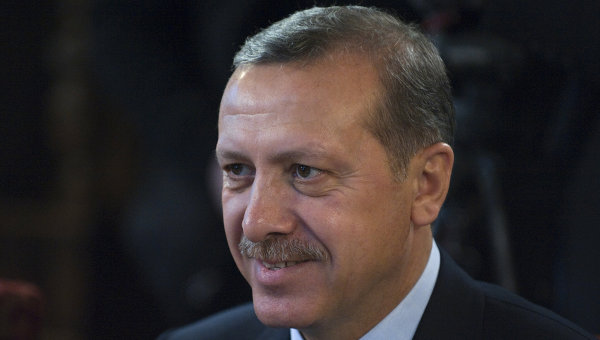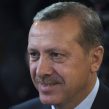
Turkish Prime Minister Erdogan Visits Bishkek
Publication: Eurasia Daily Monitor Volume: 8 Issue: 27
By:

During his visit to Bishkek on February 2, Turkish Prime Minister, Recep Tayyip Erdogan, met with Kyrgyz President, Roza Otunbayeva, and the head of government, Almazbek Atambayev. The meeting yielded a number of important political and economic results. By the end of 2011, Kyrgyzstan and Turkey will have a visa-free regime (currently Kyrgyz citizens may stay in Turkey for up to one month). Furthermore, Turkey will help Kyrgyzstan reduce its budget deficit with a $10 million grant (www.akipress.kg, February 2). Erdogan promised the funds will be transferred as early as next month. Erdogan will also encourage up to $450 million in investment.
Moreover, Turkey will increase its assistance in southern Kyrgyzstan, providing $15 million for reconstruction efforts following last year’s ethnic conflict there. Finally, Erdogan promised a larger quota for Kyrgyz students at Turkish universities, and said that the Turkish-Kyrgyz University “Manas,” which has already received $150 million in investment, will be modernized into one of the leading academic centers in the region (www.24.kg, February 2).
Erdogan praised Kyrgyzstan’s efforts to build a parliamentary democracy and promised to continue supporting the country’s political reform. The Turkish prime minister hopes that the new parliamentary system will bring Kyrgyzstan “piece, stability, and development” (www.24.kg, February 2). The Turkish leader also said that Kyrgyzstan’s success is important for the entire region and that together both countries will “build a strong Eurasia.” Erdogan offered encouragement: “Turkey moved to a multiparty system of government in 1946. During the 65 years since we have had ups and downs, challenges and unresolved problems. But thanks to reforms implemented in the last eight years, Turkey has been able to reach high democratic standards” (www.24.kg, February 2).
To foster stronger collaboration between Bishkek and Ankara, both sides agreed to launch a special Interstate Council. Erdogan also suggested that Turkey should continue its collaboration with Kyrgyzstan, by inviting Russia to joint meetings. The Turkish leader’s visit to Bishkek also carries an important symbolic meaning. Turkey is the only state with a predominantly-Muslim population that has built a robust parliamentary system. While designing the new constitution that promoted a parliamentary system of governance, some members of the Kyrgyz interim government (as well as local experts) cited Turkey’s example as being useful for Kyrgyzstan’s political development.
Erdogan visited Kyrgyzstan using rhetoric similar to that of most Western leaders – emphasizing the importance of strengthening civic liberties and allow greater political competition. While talking about Turkey’s investments into Kyrgyzstan’s economy, Erdogan also mentioned the importance of curbing corruption and enhancing the rule of law for successful interstate collaboration. Importantly, because of the perceived and real cultural commonalities with Turkey, Kyrgyz politicians of various persuasions are not as intimidated by Ankara’s calls for democratic reform, as when democracy is propagated by Western actors.
Likewise, hardliners preferring to see stronger nationalism and religious values in Kyrgyzstan consider Turkey to be an attractive example to follow. Turkey’s approval of political development in Kyrgyzstan therefore sends a strong signal to the rest of the region. “Seventy four million Turks will always be there with you, you must remember this. Turkey welcomed Kyrgyzstan’s sovereignty and if you are happy, we are happy with you, if you are going through difficulties, these are our difficulties as well. With God’s help, this friendly relationship will last forever,” Erdogan said during the meeting (www.akipress.kg, February 2).
Turkey is a favorite destination for Kyrgyzstan’s students, businessmen and tourists. Its popularity has been increasing in recent years. Although Turkey’s influence in Central Asia is rather indirect –through businesses and cultural exchange–such milestone interstate agreements foster Ankara’s image as a regional player. Incumbent Central Asian leaders, however, would only encourage any comparison of their own legacy with Ataturk’s. Erdogan is among the first state leaders to visit Kyrgyzstan since the April 2010 regime change. Kyrgyzstan’s prime minister has been mostly looking towards Russia, emphasizing that his compatriot Vladimir Putin’s government is Bishkek’s real and stable partner. Russia has indeed been a major financial donor, promising a $200 million loan during the Putin-Atambayev meeting last December. In return, Atambayev has ordered that an unnamed 4,500-meter mountain in the Tian-Shan range should be dedicated to Putin (EDM, January 6).
Erdogan did not receive a mountain peak, but in return for his continued support for Kyrgyzstan’s development, President Otunbayeva awarded him with a special medal highlighting his achievement in building bilateral relations. Atambayev, in turn, practiced his Turkish while answering journalists’ questions.




